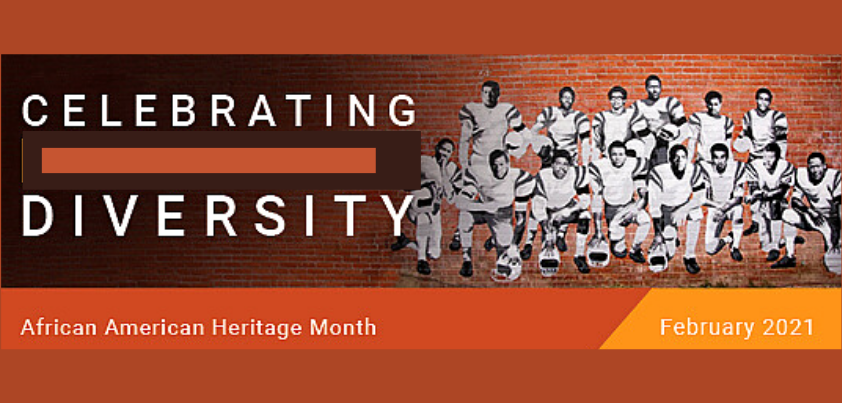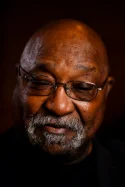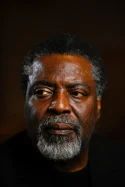Members of the Black 14 Reflect on Lives Shaped by Protest

The enduring legacy of racism in America was told by three members of the “Black 14,” the University of Wyoming football players who were cashiered from the team in 1969 for proposing to protest racism.
Speaking at the University of Maryland Global Campus African American Heritage Month commemoration Feb. 19, Mel Hamilton, John Griffin, and Anthony “Tony” McGee, not only recounted how their college careers were damaged by what happened, but also how the legacy of being part of that group followed them throughout their careers.
In 1969, Lloyd Eaton, head coach of the University of Wyoming football team, dismissed the team’s 14 Black players for asking to wear black armbands during the school’s upcoming game against Brigham Young University. The players wanted to show solidarity with UW’s Black Student Alliance protest against the racist policies of the Church of Jesus Christ of Latter-day Saints, which owns and operates BYU. At the time, the church did not allow African Americans to become priests.
They did not insist on wearing the armbands, the players said. They had only asked Coach Eaton if they could. But, after listening to their request, Eaton summarily dismissed them from the team without discussion for violating two of his rules: Scholarship players could not participate in demonstrations, and players could not form factions within the team.
The following week, UW authorities withdrew those rules as they were likely unconstitutional. Even so, the players were not reinstated for the 1969 season.
In the short term, the Black 14 lost their athletic scholarships and became targets for racist protest and threats at the university. Most of them left the university, although 11 eventually completed their college educations elsewhere.
In the long term, however, they said the stigma of being part of the Black 14 followed them and caused problems as they pursued careers—even careers in professional football.
For the university, the event destroyed the once-powerful Wyoming team, ending its winning record. The next year it had a 1-9 season and Eaton “retired” from coaching. The team had only one winning season in the 1970s.
Hamilton recalled the initial impact that being expelled from the team had on him and his fellow players.

University of Wyoming Black 14 member Mel Hamilton
“We struggled mentally about where we were in life,” he said. “Knowing that an entire state, for the most part, hated your guts. You were right in the middle of that storm. People were calling you the N-word. People were saying that Mel Hamilton was the devil himself.”
He said he tried to leave Wyoming, but no football coach at any school where he applied would touch him because of the stigma. He finally finished his education at Wyoming, but only because he had money from the GI Bill to pay his tuition.
“I lived 1969 for 50 years,” said Hamilton, who married a fellow student who wanted to stay in the state. And in every step of his public education career in Casper, he said was hounded by being one of the Black 14. When he entered a master’s program to become a school counselor, some of his fellow students tried to get him thrown out. Ultimately, he became the first Black high school counselor in the state and then the first Black principal.
“I felt the anger and the hate,” Hamilton said, adding that even his children were threatened. He appealed to the school system’s human resources department, which did an investigation. “Sure enough, gross, gross hatred, gross racism,” he said of the findings. “Hate has no bounds, no rationale.”
Griffin stayed at the University of Wyoming, too, but only because two professors helped him find academic scholarships that partially made up for the loss of the football scholarship. He was even voted back onto the football team. But, before the vote, he said he told the team they had two choices.

University of Wyoming Black 14 member John Griffin
“You can either accept me as a football player. But if you want me to change my philosophy in life and what happened, that’s not going to change. And I walked out because I wasn’t going to throw away who I am and what I represented as a Black man. I wasn’t going to give that up to play football.”
Playing with the team the next season was heartbreaking, he said because the once-mighty team had been brought low. “He killed the team,” Griffin said of Coach Eaton.
Griffin was one of six Black 14 players who were considered National Football League material. But that disastrous 1-9 season was the end for him. He went on to a career in business management, working for companies such as the Brand Co., United Airlines and Sports Authority.
But despite earning dozens of awards for his work, he said he always knew that he had to fight every step of the way to be accepted as a Black manager in corporate America.
“That’s how I prevail,” Griffin said. “But it went on for years, about the Black 14 and about being an African American in corporate America.”
McGee did make it to the NFL. He left Wyoming after the Black 14 incident and played football at Historically Black Bishop College in Texas. He was headed to be a first-round NFL draft choice but fell to the third round when word spread that he was a troublemaker due to his dismissal from Wyoming.

University of Wyoming Black 14 member Tony McGee
He was drafted by the Chicago Bears and played for the New England Patriots and the Washington Redskins during his career as a defensive lineman that lasted until 1984. He played in two Super Bowls with the Redskins, winning one. McGee, known as “Mac the Sack” for his ability to get to the opposing team’s quarterbacks, missed only one game in his 203-game career.
He was nominated to the Pro Football Hall of Fame in 1994, and he is the founder and host of Pro Football Plus, the longest-running minority-owned sports talk show in the Washington, D.C., region.
McGee was not elected to the Hall of Fame, however, even though his NFL record was as good or better than those who were selected that year, he said. He believes the stigma of being part of the Black 14 played a role.
“That was my cross to bear,” he said. “But that doesn’t define me.”
His message now to young black students is to, “Take the color out of it . . . Do your best and you can be successful.”
Share This